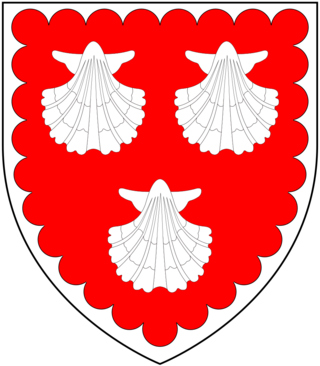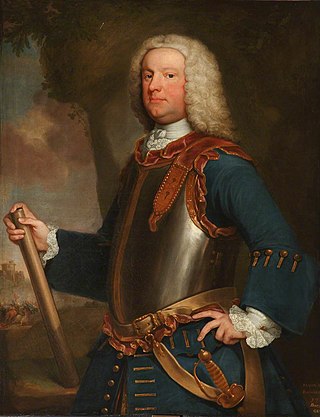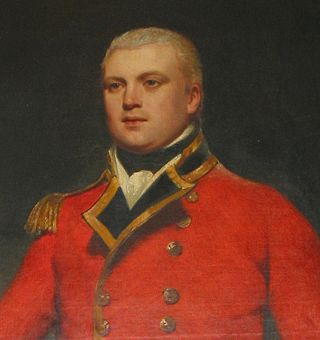Related Research Articles

Lieutenant-General Thomas Tollemache was an English Army officer and politician. Beginning his military career in 1673, in 1686 he resigned his commission in protest at the commissioning of Catholic officers into the Army by James II of England. A supporter of military intervention by the Protestant William of Orange against James II, in early 1688 he joined a regiment of the Anglo-Scots Brigade, a mercenary unit in the Dutch States Army.

George Monck, 1st Duke of Albemarle KG PC JP was an English soldier, who fought on both sides during the Wars of the Three Kingdoms. A prominent military figure under the Commonwealth, his support was crucial to the Restoration of Charles II in 1660, who rewarded him with the title Duke of Albemarle and other senior positions.

Sir Arthur Haselrig, 2nd Baronet was an English politician. A major critic of Charles I of England during the period of Personal Rule from 1629 to 1640, he was one of the Five Members whose attempted arrest sparked the First English Civil War in August 1642. As a leading Parliamentarian, he held various military and political posts during the Wars of the Three Kingdoms.

Colonel General Sydnam Poyntz, also Sydenham Poynts, was an English soldier who served in the Thirty Years' War and the English Civil War.

General Sir Charles James Napier, was an officer and veteran of the British Army's Peninsular and 1812 campaigns, and later a major general of the Bombay Army, during which period he led the British military conquest of Sindh, before serving as the governor of Sindh, and Commander-in-Chief in India.

Henry Lee III was an early American Patriot and politician who served as the ninth Governor of Virginia and as the Virginia Representative to the United States Congress. Lee's service during the American Revolution as a cavalry officer in the Continental Army earned him the nickname by which he is best known, "Light-Horse Harry". He was the father of Confederate general Robert E. Lee, who led the Army of Northern Virginia against the Union Army during the American Civil War.

Gerard Lake, 1st Viscount Lake was a British general. He commanded British forces during the Irish Rebellion of 1798 and later served as Commander-in-Chief of the military in British India.

Major-General Robert Overtonc. 1609 to 1678, was a member of the landed gentry from Yorkshire, who fought for Parliament during the Wars of the Three Kingdoms, and reached the rank of Major General in 1652. A committed republican and religious Independent who sympathised with the Fifth Monarchists, like others with similar views he opposed the establishment of The Protectorate, and was held in the Tower of London from 1655 to 1659.

Sir Henry Gage was a Royalist officer in the English Civil War.

The governor of Bermuda is the representative of the British monarch in the British overseas territory of Bermuda.
Sir Arthur Aston (1590–1649) was a soldier, most noted for his support for King Charles I in the English Civil War, and in folklore for the gruesome manner of his death in Ireland. He was from a prominent Roman Catholic family originating in Cheshire. He was killed during the Siege of Drogheda in September 1649 during the Cromwellian Conquest of Ireland.

General Thomas Erle PC of Charborough, Dorset, was a general in the English Army and, thereafter, the British Army. He was also a Whig politician who sat in the House of Commons of England and of Great Britain from 1678 to 1718. He was Governor of Portsmouth and a Lieutenant-General of the Ordnance.
Thomas Rudd (c.1583–1656) was an English military engineer and mathematician.

Lieutenant-General Richard Onslow was a British Army officer and politician. After the death of their parents, his older brother Arthur bought him a captain's commission in the British Army. He first saw action in the Anglo-Spanish War in 1727, after which he was returned to Parliament for the family borough of Guildford. His political contributions were negligible in comparison to his brother, and he continued to serve as a career officer, holding commands in the War of the Austrian Succession at Dettingen and Fontenoy. In 1759, he was appointed Governor of Plymouth and commander of the Western District, and died as a lieutenant-general the following year while presiding over two prominent courts-martial.
Hezekiah Haynes supported the parliamentary cause during the English Civil War rising to the rank of major. During the Interregnum, under the patronage of his war time commander General Charles Fleetwood, he held a number of administrative posts in the under the early Commonwealth and Protectorate. He supported his old general during the late Commonwealth, and after spending 18 months in prison during the first couple of years of the Restoration, he retired to the family estate of Copford Hall in Essex.

General Sir David Graham Muschet Campbell, was a cavalry officer of the British Army, an amateur sportsman, and later Governor of Malta.

General Sir Tomkyns Hilgrove Turner KC was a British Army officer best known for escorting the Rosetta Stone from Egypt to England.

Thomas Setzer Hutchison was an American military officer, volunteer officer in Greece, police commissioner, civil reformer, author and inventor.
Thomas Pearce, PC was an English army officer, a privy councillor and a member of parliament. During the War of the Spanish Succession he was deputy commander-in-chief in Portugal later serving in Gibraltar. He was appointed to Ireland in 1715, spending his last five years in Dublin where he died in 1739, General of his Majesty's Forces in Ireland.
The 1904 Birthday Honours were announced on 9 November 1904, to celebrate the birthday of King Edward VII that day. The list included appointments to various orders and honours of the United Kingdom and the British Empire.
References
![]() This article incorporates text from a publication now in the public domain : "Elton, Richard". Dictionary of National Biography . London: Smith, Elder & Co. 1885–1900.
This article incorporates text from a publication now in the public domain : "Elton, Richard". Dictionary of National Biography . London: Smith, Elder & Co. 1885–1900.